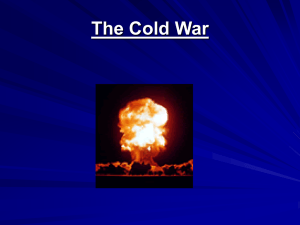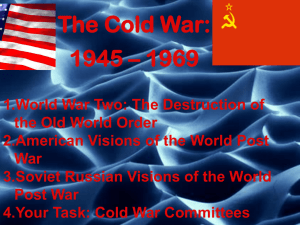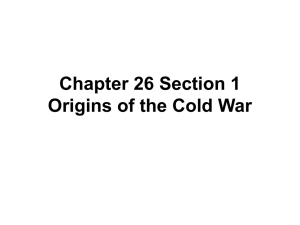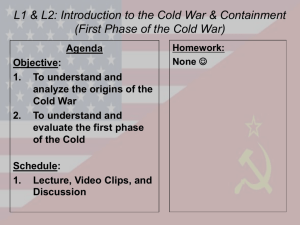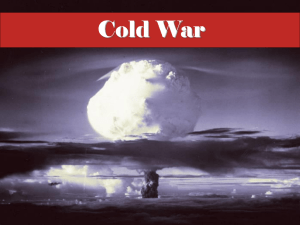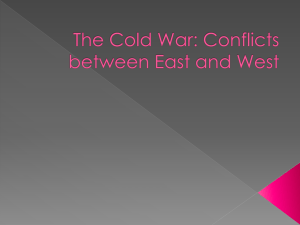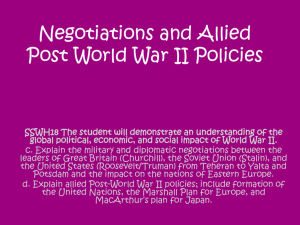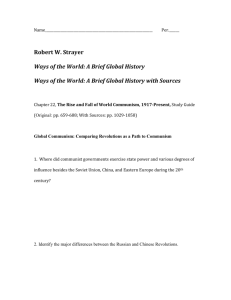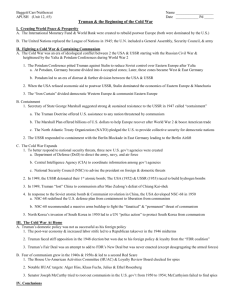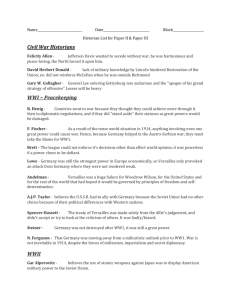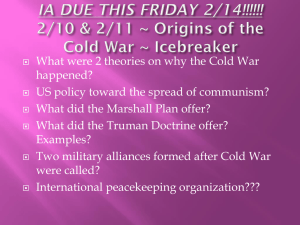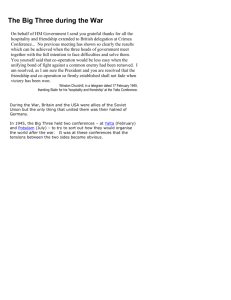Origins of the Cold War ppt1
advertisement
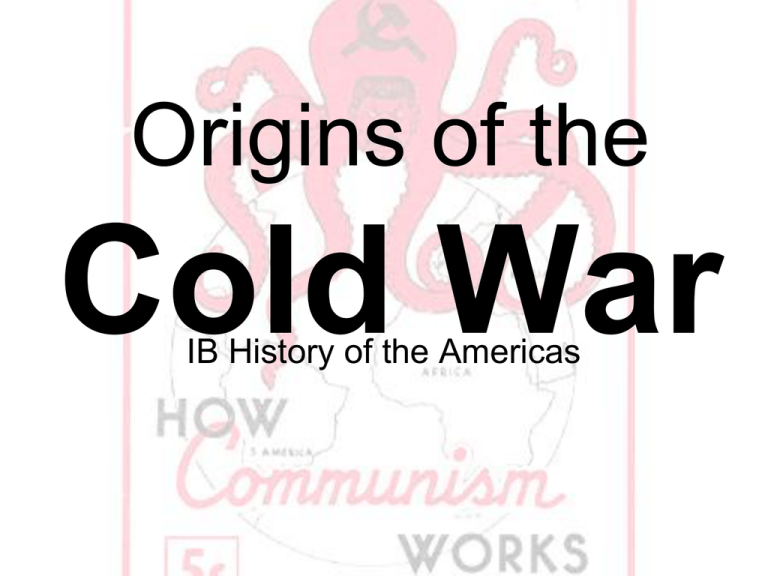
Origins of the Cold War IB History of the Americas Part 1: Capitalism v. Communism Objective Differentiate between communism and capitalism and examine their advantages and disadvantages What is Communism? • This is the symbol of Communism – The Hammer and the Sickle Hammer for the Workers Sickle for the Peasants – the farm labourers They wrote the ‘Communist Manifesto’ in 1847. It’s a short book – but billions of people have read it…. This is Karl Marx, the ‘Father of Communism’. People who believe in his ideas are called ‘Marxists’ This is his good friend, Frederick Engels. Capitalism • a system based on private ownership and on investment of money in business in order to make a profit Communism • a system in which goods are owned in common and are available to all as needed Advantages and Disadvantages of Capitalism • Advantages: – You can own property – Individuals can prosper/competition for wages – Freedom of speech, press, religion – Embrace ethnic diversity – Makes the individual work worth something • Disadvantages: – Poverty – Not everyone has healthcare – Monopolies- control too much business – Creates inequalities (ex: rich vs poor, have vs have not) Advantages and Disadvantages of Communism – Advantages: – Everyone gets something (equal) – No unemployment – Healthcare for all citizens – Cooperation of the people (work for the country to benefit) – Disadvantages – Abuse of power – Restrictions- no freedom of speech, press, no religious practices – Censorship – Against ethnic diversity – Government controls property- very little if any, could own private property – Individual doesn’t compete, in some ways lazy and does not need to strive for more Homework • In 1 OEA paragraph, answer the question: Is communism a good or bad idea for society? Use at least 2 examples as evidence. Part 2: Understanding the Origins of the Cold War GUIDING QUESTION Why did relations between the United States and the Soviet Union devolve into a Cold War after the Second World War? The Cold War 19451991 Cold War Basics: • Who? – Tensions between 2 “superpowers” (The United States and USSR) • When? – 1945-1991 (End of WWII to fall of Berlin Wall) Cold War Basics: • Where? – Whole World • What? – Arms Race – Space Race – Spying – Propaganda Cold War Basics: • Why did the US fear communism? – Communists want to take away private property – They take away their people’s rights (ex. Speech, religion) – They want to spread their ideas worldwide ORIGINS OF THE COLD WAR • Basic incompatibility of economic and political systems • History of discord and mistrust ORIGINS OF THE COLD WAR • WWII Alliance of Britain and U.S. with Soviet Union was a “marriage of convenience” to defeat Germany 1. Lack of trust of Stalin 2. Soviets believed western allies were not sharing all information Development of the Cold War • The Cold War (1945-91) was one of perception where neither side fully understood the intentions and ambitions of the other. This led to mistrust and military build-ups. • United States – U.S. thought that Soviet expansion would continue and spread throughout the world. – They saw the Soviet Union as a threat to their way of life; especially after the Soviet Union gained control of Eastern Europe. Development of the Cold War • Soviet Union – They felt that they had won World War II. They had sacrificed the most (25 million vs. 300,000 total dead) and deserved the “spoils of war.” They had lost land after WWI because they left the winning side; now they wanted to gain land because they had won. – They wanted to economically raid Eastern Europe to recoup their expenses during the war. – They saw the U.S. as a threat to their way of life; especially after the U.S. development of atomic weapons. Cold War Mobilization by the U.S. • Alarmed Americans viewed the Soviet occupation of eastern European countries as part of a communist expansion, which threatened to extend to the rest of the world. • In 1946, Winston Churchill gave a speech at Fulton College in Missouri in which he proclaimed that an “Iron Curtain” had fallen across Europe. • In March 1947, U.S. president Harry Truman proclaimed the Truman Doctrine. The “Iron Curtain” From Stettin in the Balkans, to Trieste in the Adriatic, an iron curtain has descended across the Continent. Behind that line lies the ancient capitals of Central and Eastern Europe. -- Sir Winston Churchill, 1946 YALTA (in the USSR) Date: Feb 1945 Present: Churchill, Roosevelt and Stalin Wartime Diplomacy • Yalta Conference (January-February 1945) – Loose set of principles that avoided the serious issues. – Division of Germany (and Berlin) into four “zones of occupation”; Reunification of Germany at a future date; process not specified – Soviets would enter Pacific war within 3 months after Germany had been defeated – United Nations – Poland – free elections at some unspecified date Churchill, Roosevelt and Stalin at Yalta, February 1945 after the war POTSDAM (Germany) Date: July 1945 Present: Churchill, Truman and Stalin Wartime Diplomacy • Potsdam Conference (July-Aug. 1945) – Reparations: Stalin allowed to take 25% of West German industry – Nazi leaders: to be tried as war criminals at Nuremberg – Poland: Free elections – Japan: Unconditional surrender – Korea: to be temporarily divided • Truman’s attitude – Atomic bomb Churchill, Truman and Stalin at Potsdam Causes of Cold War • Soviets the main cause Aggressive policies of expansion (in eastern Europe) and violation of Yalta agreements • U.S. the main cause By insisting that entire world be open to American trade and influence (capitalist expansionism & internationalism) • Neither/Both the cause Two most powerful nations in world bound to clash – Through ignorance and misconceptions, both countries helped to create an atmosphere of tension and suspicion that touched off the Cold War • Could the Cold War have been avoided? How? “Hot Wars”: • Korean War • Vietnam War Korean War Veterans Memorial - Washington, DC Soviet “Satellites”: • Satellites – East European countries that “revolve” around the USSR • Meant to protect USSR from US influence, future German attack Truman Doctrine: • US will support all free peoples around the world from communist influence – Ex. Greece & Turkey Harry S. Truman 1948 Containment: • US will stop communism from spreading (but not attack existing communist countries) • Domino Theory – if one country falls, then others will too (like dominos) Marshall Plan: • What? – US gives billions to European countries • Why? – Countries with healthy economies do not go communist
